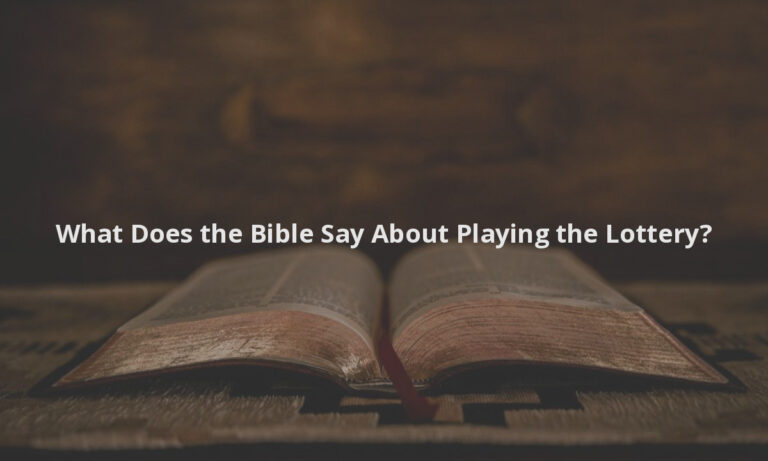The allure of the lottery, a tantalizing chance to transform a modest investment into a life-altering fortune, has captivated many. For Christians seeking guidance, it’s essential to explore what the Bible conveys about such practices. While the Scriptures don’t explicitly mention modern lotteries, they offer principles that can be applied to this contemporary issue.
The Bible’s Stance on Gambling
The Bible doesn’t directly address the act of gambling or playing the lottery. However, it provides clear warnings about the love of money and the desire for quick wealth. 1 Timothy 6:10 states, “For the love of money is a root of all kinds of evil.” This suggests that an excessive desire for wealth can lead to spiritual pitfalls. Additionally, Proverbs 13:11 warns, “Wealth gained hastily will dwindle, but whoever gathers little by little will increase it,” emphasizing the value of diligent labor over seeking sudden riches. OpenBible
Stewardship and Trust
Christians are called to be stewards of God’s provisions. Engaging in the lottery might reflect a reliance on chance rather than trust in God’s plan. Romans 14:12 reminds believers of their accountability: “So then, each of us will give an account of ourselves to God.” This underscores the importance of using resources wisely and trusting in God’s provision rather than seeking quick financial gains through gambling.
The Temptation of Greed
The desire to win big can stem from greed. Luke 12:15 cautions, “Watch out! Be on your guard against all kinds of greed; life does not consist in an abundance of possessions.” This highlights the danger of placing material wealth above spiritual well-being. Furthermore, Ecclesiastes 5:10 notes, “He who loves money will not be satisfied with money,” indicating that the pursuit of wealth can lead to dissatisfaction and spiritual emptiness.
The Role of Casting Lots
Some might reference the biblical practice of casting lots as a justification for lotteries. However, casting lots in the Bible was a method to discern God’s will, not a means to gain wealth. For instance, in Acts 1:26, the apostles cast lots to select a replacement for Judas Iscariot. This practice was rooted in seeking divine guidance, not personal gain. Modern lotteries, by contrast, revolve around random chance for private profit, which differs significantly from the biblical context of casting lots.
The Impact on Society
Engaging in lotteries can have broader societal implications. Often, those with limited means are the most frequent participants, hoping for a financial breakthrough. This can lead to financial strain and perpetuate cycles of poverty. Christians are encouraged to consider the broader impact of their actions on the community. As noted by Grace to You, “The people who buy the tickets are the people who can least afford to buy the tickets,” highlighting the potential harm to vulnerable populations.
Personal Convictions and Conscience
Romans 14:23 states, “But whoever has doubts is condemned if they eat, because their eating is not from faith; and everything that does not come from faith is sin.” This suggests that if participating in the lottery causes internal conflict or doubt, it may not be appropriate for that individual. Dr. Roger Barrier emphasizes the importance of personal convictions, noting that “violating our consciences is expressly forbidden in the Bible because a violated conscience impairs our ability to hear God speak.”
The Principle of Contentment
The Bible teaches believers to cultivate contentment, recognizing that true fulfillment is found in God rather than in the fleeting promises of riches. Hebrews 13:5 advises, “Keep your lives free from the love of money and be content with what you have.” This emphasizes the importance of satisfaction with one’s current blessings and warns against the pursuit of wealth as a source of happiness. OpenBible
Honest Work and Gain
Scripture teaches diligence and honest work as the ordinary means to obtain provision. In Proverbs, the accumulation of wealth through righteous labor is contrasted with quick or ill-gotten gain. Proverbs 13:11 states, “Dishonest wealth will dwindle, but what is earned through hard work will be multiplied.” While the lottery promises sudden financial reward, the Bible commends diligent endeavor and warns against shortcuts that may bypass wise effort and pursuit of excellence.
Potential Consequences
Beyond the spiritual dimension, lottery play can trigger financial strain, feed addictive behavior, or undermine contentment. Studies across behavioral science indicate that repeated gambling can result in adverse effects on personal relationships and mental health. The biblical vision calls for freedom and joy in Christ. Anything endangering that freedom, whether addiction or crushed expectation, deserves serious consideration.
Balancing Christian Liberty
Romans 14:5-6 teaches that believers have freedom of conscience in disputable matters. However, such liberty must be grounded in love for God and others, avoiding temptation and not causing stumbling. If the lottery fosters temptation or financial irresponsibility, prudence leads many to abstain. As noted by Crosswalk.com, “Whether or not buying a lottery ticket is a sin depends on our convictions.”
Conclusion
While the Bible doesn’t directly address modern lotteries, it offers guiding principles emphasizing contentment, trust in God, and the dangers of greed. Christians are encouraged to reflect on their motivations and the potential implications of participating in such activities. Seeking counsel, praying for wisdom, and considering the broader impact can aid in making informed decisions aligned with one’s faith.

